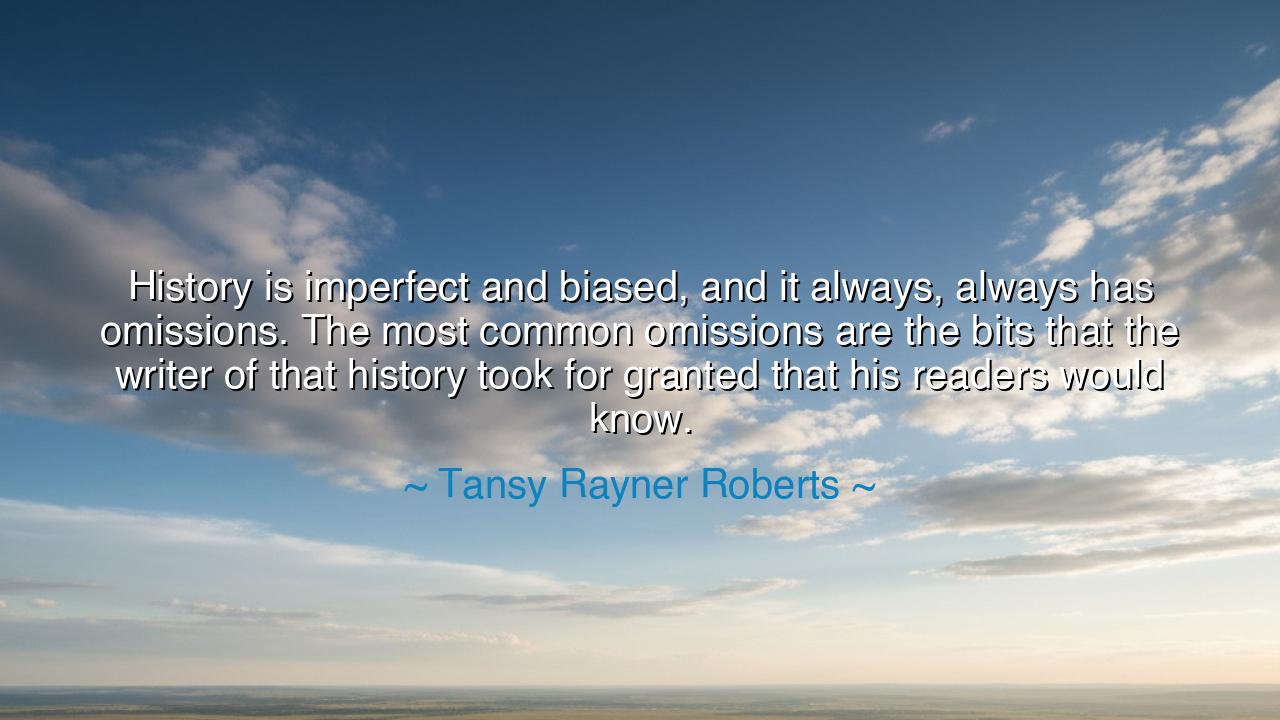
History is imperfect and biased, and it always, always has
History is imperfect and biased, and it always, always has omissions. The most common omissions are the bits that the writer of that history took for granted that his readers would know.






“History is imperfect and biased, and it always, always has omissions. The most common omissions are the bits that the writer of that history took for granted that his readers would know.” Thus spoke Tansy Rayner Roberts, the teller of stories and the weaver of worlds, whose words strike deep into the heart of truth. In this reflection, she unveils the ancient paradox of history — that it is both our greatest teacher and our most unreliable witness. For history, though revered as the memory of humankind, is not a perfect mirror. It reflects not the whole of what was, but what the writer chose to remember, what the age deemed important, and what the reader was expected to already understand. It is a tapestry woven with missing threads — beautiful in form, yet forever incomplete.
In the wisdom of the ancients, memory itself was seen as both sacred and fragile. The bards, the scribes, the chroniclers of kingdoms — each was entrusted with preserving truth, yet each carried the limitations of their own vision. Roberts reminds us that bias is not merely a flaw of the dishonest, but the inevitable mark of perspective. To write history is to select from the infinite — to choose one path through the forest of time and leave the others unmarked. And so, even the most honest historian cannot escape the silent distortions of culture, belief, and assumption. The omissions she speaks of are not only deliberate silences — they are the unspoken understandings that time itself erases.
Consider, for example, the histories of ancient Greece. We have the writings of Herodotus and Thucydides, who gave us epic accounts of war and politics. Yet what do we truly know of the women of Athens, of the slaves who built its monuments, of the children who learned its stories? Their lives were so common, so familiar to their contemporaries, that the chroniclers did not bother to describe them. They assumed the reader already knew — and thus those lives vanished into silence. What was “too obvious to mention” became, for future generations, forever unknown. So it is that history’s omissions are often not the strange, but the ordinary; not the hidden, but the once-taken-for-granted.
Roberts’s words ring especially true in the modern age, when the record of the past is often treated as sacred scripture rather than human creation. We forget that history is not a single voice, but a chorus — and that many voices were silenced before the song was written. The victors, the powerful, the literate — they shaped the narrative, while the rest of humanity left only whispers. When she calls history “imperfect,” she is not condemning it, but unveiling its nature: that every story told by man bears the shadow of his time and place. The truth of history lies not in its certainty, but in our willingness to question it — to listen for the echoes of those who were left out.
And yet, there is a kind of grace in this imperfection. For in realizing that history is biased and incomplete, we are freed from blind reverence. We learn to seek the missing voices, to look between the lines, to ask not only what happened but who was forgotten. Every generation must, therefore, write its own history anew — not by erasing the past, but by expanding it. The historian’s task is no longer merely to record, but to recover — to restore the silenced, the ordinary, the overlooked. To read history well is to engage in a dialogue across time, not a submission to authority.
Think of the rediscovery of the letters of ordinary soldiers in the First World War, which revealed truths that no general’s memoir ever could — the fear, the longing, the humor that endured amid horror. Or the resurgence of indigenous histories, once dismissed by colonial writers, now shining as essential truths of human experience. Each of these restorations is an act of justice, a defiance against forgetting. It is proof that the omissions of the past need not remain eternal; that through curiosity and empathy, we can make history whole again, or at least more honest in its incompleteness.
So, my child of the future, take heed of Tansy Rayner Roberts’s wisdom. Do not trust history blindly. Question its silences. Seek its missing hearts. Remember that the truths you inherit are but fragments of a greater story — one that you, too, must help to tell. When you read, read with wonder, but also with suspicion; when you write, write with humility, knowing that you too will leave things unsaid. And most of all, listen — to the voices of your elders, your peers, and the forgotten. For only when you gather these many strands together will you glimpse something closer to the full tapestry of humankind.
In the end, history is not a monument of facts, but a living conversation between the past and the present. Its omissions remind us that truth is never finished — that it waits, always, for new eyes to see it and new hearts to tell it again.






AAdministratorAdministrator
Welcome, honored guests. Please leave a comment, we will respond soon